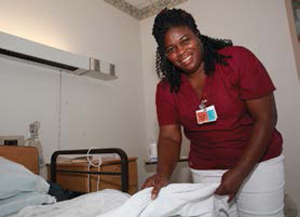Seven Minutes by Clova James
August 12, 2015
Clova James has been a CNA at the Parker Jewish Institute for Health Care and Rehabilitation in New Hyde Park, NY for 8 years. She’s a delegate and has served as a member of the Union’s contract negotiating committee. She helps take care of up to 41 patients every day. Short staffing makes it a constant struggle, she says. James and her co-workers feed, dress, bathe and often provide total care for their residents. And then there’s the paperwork. On every shift, workers are given seven extra minutes to complete all of this; if they clock out later, they’re penalized. “What inspired me to write this was that I’ve had to represent quite a few members as their delegate for that seven-minute penalty,” she says. “And I had to say something. It’s just so unfair.”
I AM A NATIVE OF JAMAICA and a CNA at Parker Jewish Institute in Queens, NY. I work from 11 p.m. to 7:15 a.m. Ever since I was a child I’ve had a gift for caring and compassion. I used to take people off of the street to bathe and feed them. When my grandmother took sick, taking care of her came naturally. It never felt like a burden at all. It pleased me to administer quality care to her until she passed away. She made me promise that I would use my gift to help others.
Some time passed after her death and I came to America, I started my own business and was a cosmetologist for about 35 years. One day, a customer, who happened to be director for a nursing home, came in to get her hair done. We engaged in conversation about caregiving and it all came back to me: the promise I made to my grandmother. I told her about it and she asked if I was interested in a CNA training program. I was ecstatic and immediately said yes. All the while, I was thinking about my grandmother smiling down at me and leading me one step closer to my destiny.
MY NIGHTS CONSIST of various tasks. I check on all patients and make sure they’re comfortable. I make sure they have been fed and are hydrated. I ask if a patient would like water, tea, juice or coffee. In addition, I change each patient, which is done every two hours. In between tending to these patients’ needs I must pack our linen carts, get fresh water for each room, provide proper dental care like washing patients’ mouths, and change patients’ nightgowns and bed linens.
There are some patients who put up a fight in every job and some who will not. Some patients refuse to eat during the day and I have to talk them into eating and drinking, so they stay healthy. Thankfully they listen to me. We all know it’s not the easiest of tasks. It does take time, but it is the patients’ health that counts. Some patients may have trouble going to the bathroom and I have to help them because that can be very dangerous as well. I will give up my break at times just to ensure my patients are well taken care off. This is my choice, but I don’t mind at all because it is more important to me that they are okay.
ALL OF THIS WORK is divided between me, another CNA and a RN. There are 41 patients to a floor. These tasks can take anywhere from 10 to 45 minutes per patient. We are told to document each task as we go—which can be a task in itself. When all of this is completed I try to document what I have done overnight by 7:15 a.m. or in the allotted Seven Minute Grace Period. If we don’t do all of this within that time, we’re written up or penalized.
What matters to me is to hear my patients say, “Thank you, God bless you” or “I am praying for you.” It lets me know I’m doing more than just a mere service to them. I am touching their hearts. I am here for each and every one of my patients, heeding every one of their calls, because I know they cannot do for themselves. I go above and beyond for all my residents. So you may ask: what’s more of a priority? Giving quality care or clocking out within that seven minute grace period? It’s hard to achieve both without the proper staffing, which we currently do not have, but I refuse to give my patients half of my time. They receive my full attention. Every minute of it.


